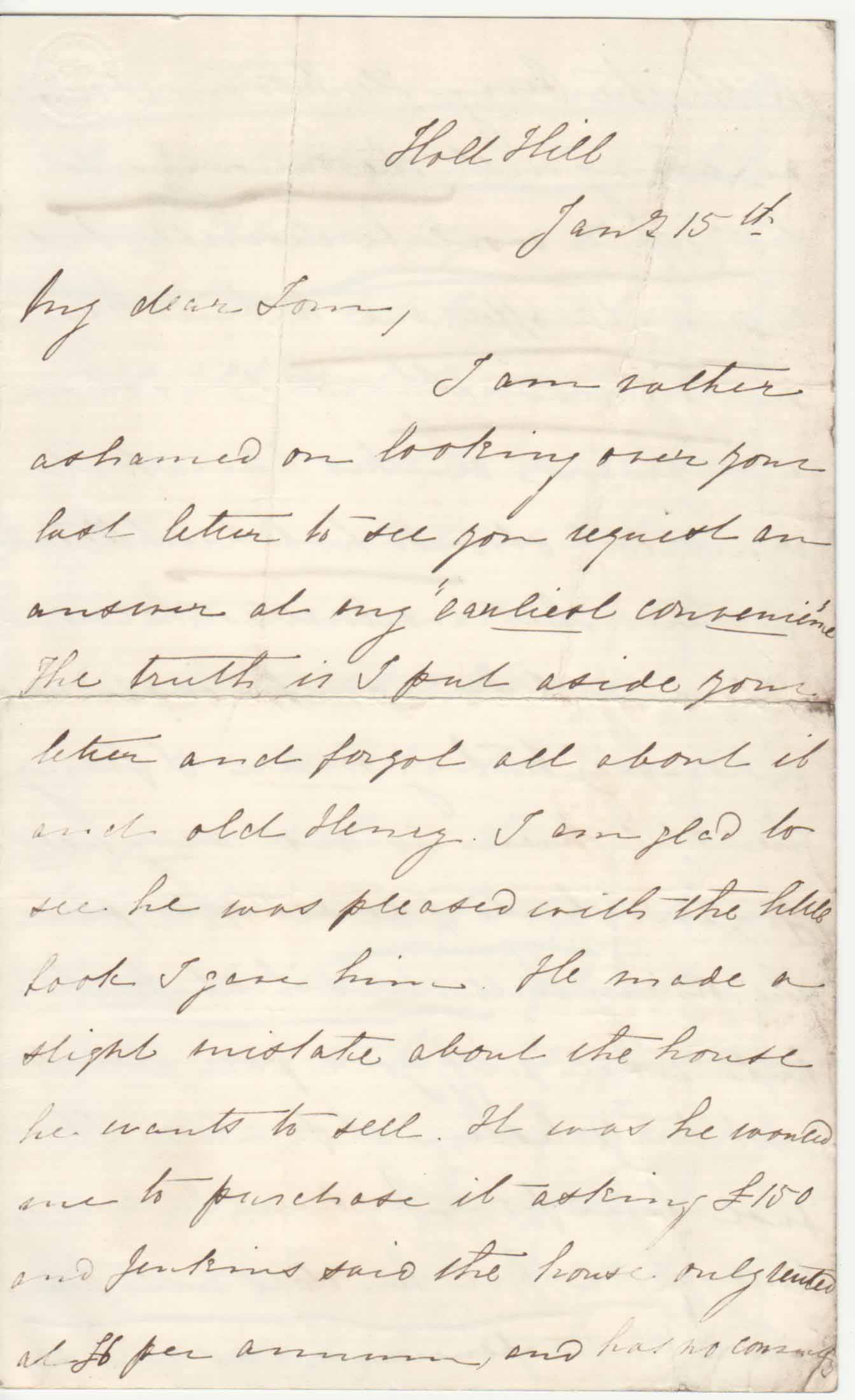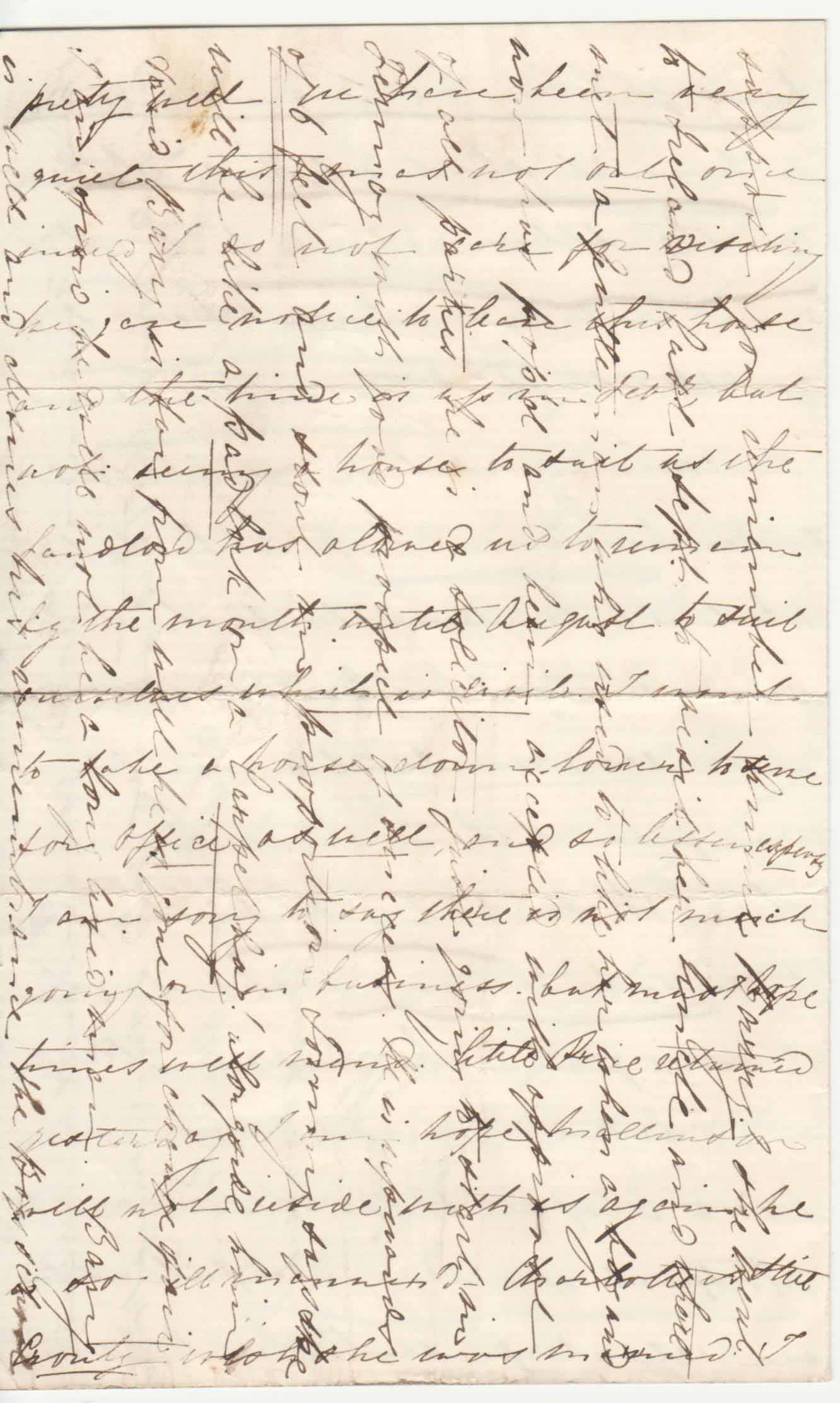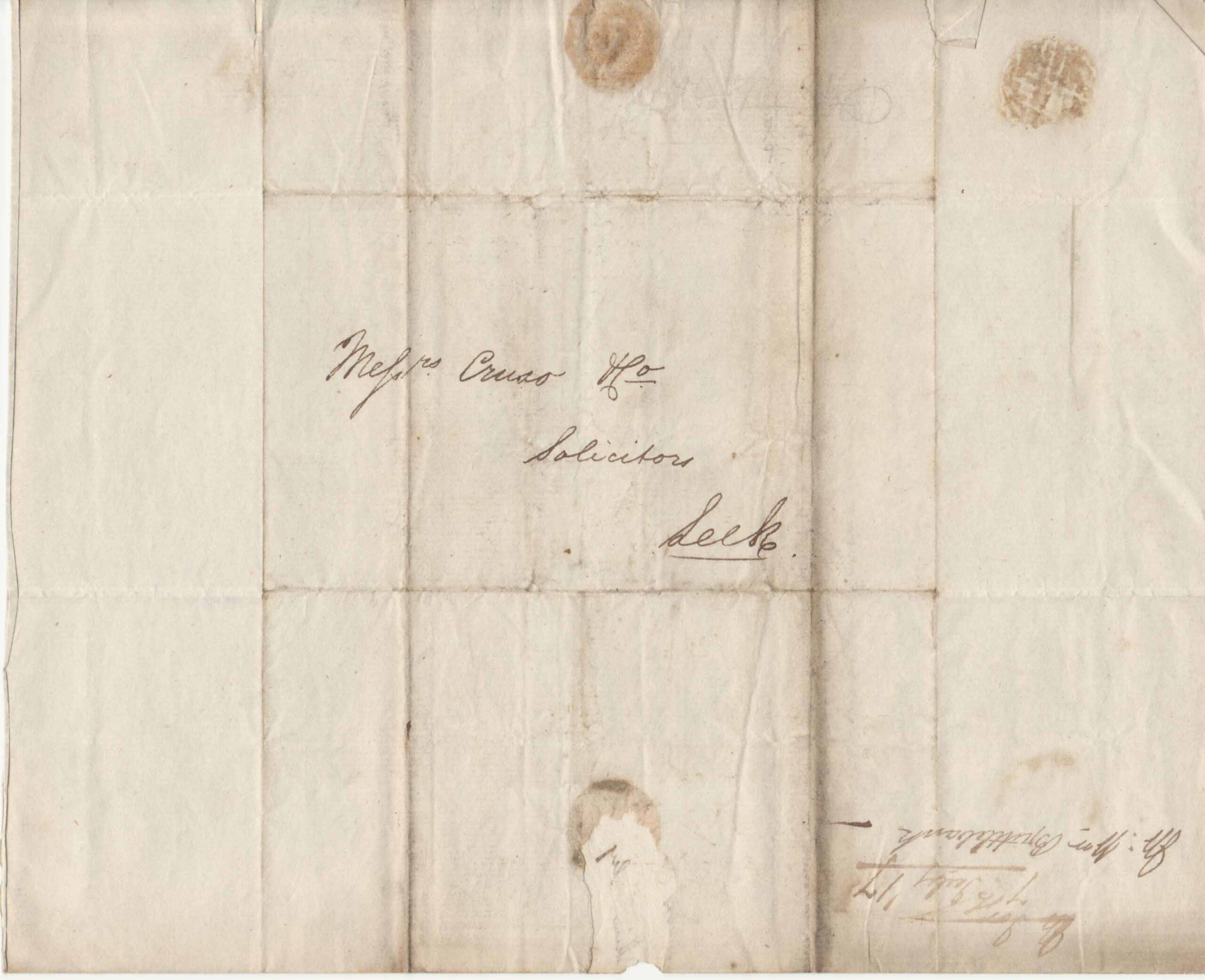A Cross-Written Victorian Correspondence (c. 1846)

Image © Collection of Ian Waugh / Old British News Archive.
A three-page letter written from Hall Hills, near Dalston in Cumberland, to the Fothergill family at Leek, Staffordshire, around January 1846.
Authored by A. H., a literate and observant woman, it reveals a vivid picture of mid-nineteenth-century domestic life — family news, property dealings, weather, and moral reflection — and concludes with a cross-written postscript about a magistrate’s trial then occupying local talk.
The folded sheet was addressed to Messrs Ewin & Co., Solicitors, Leek, bearing the endorsement “G. H. Fothergill Esq., from Cumberland.”
Full Verbatim Transcription
(Hall Hills, 15 January [1846 est.])
Hall Hills,
January 15th.
My dear Fanny,
I am rather ashamed, on looking over your last letter, to see that you waited so long for an answer. The truth is, I put your letter aside and forgot all about it — such old things! I am glad to hear he was pleased with the Hills book I gave him. He made a slight mistake about the house he wants to sell. It was he who wished one to purchase it, asking £400, and Jenkins said the house only let at £14 per annum and had no conveniences. I think he must have been thinking of the Union Street house when he spoke to you. You know we gave £420 for this, and it is let for £22. It was a pity we had not known before that he wished to sell, as it would have suited Jemmy. However, it is of no consequence now.
I am sorry you have had such unpleasant weather and so many colds. We have had very fine weather here until this morning, when it began to snow, and it now looks as if it means to continue all day. There is plenty of snow on the ground, and if the wind changes to the east we shall have it thick enough. The boys will enjoy it; they are both very fond of snow and skating. I have been so very busy lately that I have not had time to write many letters, but I am going to try to get through my arrears this week. We were glad to hear that Mr Williamson was much better, and that you were all well. We are all pretty well here except for the children’s colds. I must now bring this long letter to a close with love from all to yourself and Mr F.
Believe me,
Your affectionate cousin,
A. H.
Forty-five pounds were saved after paying all expenses. Speed the “Girl” (?), oh my ever steady — but thank God I feel quite released now, and though they gave no reason I felt sure we should; from news a renewed scare never coming on me — indeed a happy one only that I’ll not leave you any less kind letter to your own home. My dearest love and best regards. I knock off feeling ever yours,
A.
Cross-written Postscript
The party and I think of you often and hope that your dear old father is now quite well again. The magistrate’s trial should, I think, soon be done, as there is not much more evidence to come, though they talk as if much must still be produced before all is cleared up. We are all anxious for the result and trust it may prove favourable. There has been so much talk and writing about it that one scarcely knows what to believe, yet I cannot think it so very bad as they would have us fear. I wish you could be here to hear all that is said; everyone is talking, and some so foolishly that it makes one weary to listen. I am thankful you keep up your spirits and trust in Providence for the right issue. I long for the time when we can all meet again and speak of these things quietly.
Farewell now, dear friend, with truest affection ever your own,
A.
Outer Address Panel
Messrs Ewin & Co.
Solicitors
Leek
(upper corner note:)
G. H. Fothergill Esq. — H. from Cumberland.
(two red wax seals, one partly torn)
Historical & Research Notes
 Date: Heading gives “Hall Hills, Jan 15th”; physical and contextual evidence (cross-writing, paper type, absence of postage stamp, reference to Ewin & Co. and G. H. Fothergill) places the letter c. 1846.
Date: Heading gives “Hall Hills, Jan 15th”; physical and contextual evidence (cross-writing, paper type, absence of postage stamp, reference to Ewin & Co. and G. H. Fothergill) places the letter c. 1846.
Writer: The signature “A. H.” likely represents Ann Hall or Ann H. Fothergill, resident of Hall Hills near Dalston, Cumberland. The household appears in tithe and census records of the 1840s–1850s.
Recipient: “Fanny,” addressed through Messrs Ewin & Co., Solicitors, Leek, is almost certainly Frances Fothergill, wife or cousin of George Henry Fothergill (1802–1867), solicitor of Leek and later J.P. for Cumberland.
Social Context:
Cross-writing was an economical practice before envelopes became common, allowing two layers of text on a single sheet. The letter reveals domestic literacy, social respectability, and female authorship within a provincial middle-class network. Discussion of rent (£22 p.a.) and sale value (£400–£420) reflects mid-Victorian property economics.
Local References:
Hall Hills was a known farmstead south of Dalston. The mention of snow, skating, and “the boys” situates the family in northern winter life. The postscript’s “magistrate’s trial” probably refers to proceedings at Carlisle Assizes early in 1846, which dominated Cumberland newspapers that season.
Postal Evidence:
The folded outer sheet bears two wax-seal marks and is addressed:
“Messrs Ewin & Co., Solicitors, Leek.”
In the corner: “G. H. Fothergill Esq., H. from Cumberland.”
This implies private carriage or pre-stamp posting rather than use of a Penny Post envelope.
 Identified Persons Appendix
Identified Persons Appendix
- A. H. – Writer; probably Ann Hall or Ann H. Fothergill of Hall Hills, Dalston, Cumberland.
- Fanny – Frances Fothergill, recipient and cousin; resident near Leek, Staffordshire.
- Mr F. – George Henry Fothergill, Esq. (1802–1867), solicitor of Leek; likely the husband of Fanny.
- Messrs Ewin & Co. – Solicitors recorded in Pigot’s 1842 Directory (Leek).
- Jenkins – Estate agent or valuer mentioned in discussion of rental property.
- Jemmy – Younger relative; potential property purchaser.
- Mr Williamson – Family friend; recovering from illness.
- The Boys – Writer’s sons; “fond of snow and skating.”
- G. H. Fothergill Esq. – Named on outer panel; solicitor and probable recipient.
Identifications drawn from internal textual evidence, Cumberland & Staffordshire directories, and handwriting comparison.
Where uncertain, names are given as probable.
Editorial Commentary
This letter stands as a small but eloquent artefact of mid-Victorian domestic life.
A. H.’s tone combines modesty, businesslike detail, and affectionate warmth.
The inclusion of financial figures beside concern for weather and health illustrates the intertwined spheres of home management and estate responsibility among educated provincial women.
The cross-written postscript adds emotional depth — a voice layered literally upon itself, reflecting both economy and intensity.
Her trust in Providence and patience for “the right issue” speak to a moral framework characteristic of the 1840s: faith, restraint, and duty.
In material form and sentiment alike, the Hall Hills letter captures a moment when correspondence was an art of presence across distance — an enduring bridge between Cumberland snow and Staffordshire hearth.
Compiled and annotated by Ian Waugh.
© 2025 Old British News / OldDays.co.uk – All rights reserved.
